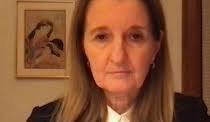A bit over half a year ago now, on October 14 of 2024, I put up on this blog-site my post “The Choice to Choose.” Once he had read that post, a friend of mine asked me a question about it. He asked me if what I said in that post entailed that it was always the case that one should make a choice immediately when one is faced with options. I replied that there were often cases in which one needed to wait until the right way to go became clear, before one chose to go any given way.
That is, my reply to my friend’s question was that there were often moments in one’s life when precisely the right choice to make at that very moment was the choice to wait for the situation further to clarity itself. In other words, I replied to him that there were times when choosing to wait was precisely the right choice for one to make at that time.
Hence the first, main part of the title I have chosen to give today’s post: “Choosing to Wait.”
As for the parenthetical subtitle I have chosen to give this same post, what I have to say in the next section of this current post will explain that, as readers patient enough to wait until they have read that section attentively will eventually discern.
* * *
Two weeks and six days after my post “The Choice to Choose” first went up on this blog-site, I was taking my normal early-morning shower when, unexpectedly, my friend’s question about that post and my response came back into my mind. Immediately thereafter the thought came to me that I might want to write a post entitled something such as “Waiting to Choose.”
I heard and harkened to the voice of that thought. Accordingly, after I finished my shower, followed right after by my regular breakfast, I began to compose this current post. As I was doing that, another thought soon came to me. This time it was the thought to dedicate this very post to that friend the thought of whose question and my response to it had come to my mind during my shower. And then the further thought came to my mind that I could simply indicate that dedication by way of a parenthetical subtitle to the post I had just begun to write.
With no wait at all, I did just that. The situation demanded no further clarification.
* * *
Nor did I have the slightest hesitancy about deciding just when I should put up this current blogpost. I knew immediately that I should post it on today’s date of April 28, 2025, which is a bit more than six months delay from when the idea for this post first came to me during my morning shower.
That immediate certainty was there for me because I had already written and scheduled all of the posts that have been posted on this blogsite since that morning of November 3 , 2024, when the idea for today’s post first came to me during my daily shower. The next available upcoming date for putting up this current post — if I posted it, as I fully and immediately intended to do, only after all my already written posts had gone up — was today.
* * *
However, there was nevertheless one uncertainty left.
That remaining uncertainty was about whether to announce that, after this current post, I would post no more in accordance with what has long been my customary schedule for posting on this blog, but rather that I would put up a new post only when time and spirit moved me to compose one and make it available.
My posting schedule for years now has been to put up a post on the second and fourth Mondays of each month between my birthday on January 1 and Memorial Day on the last Monday in May, and then again on the second and fourth Mondays between Labor Day in September and Thanksgiving Day in November. My remaining uncertainty simply concerned whether I should continue to follow that schedule or not.
Well, that single remaining uncertainly about today’s post no longer remains. Therefore I will end this post with the following announcement:
NOTE TO MY REGULAR READERS: After today’s post, I will post again on this blog only if and when time and spirit move me to do so. Thank you all for your attentive readership over the years!











